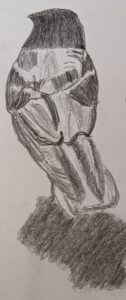My everyday was so much easier in Germany. Antisemitism didn’t play silly buggers with the ground I walked on there, as it does in Australia. Australian antisemitism is mostly gentle and kind, but no less troublesome for that. Until I went to Germany I had no idea of its place in the general scheme of things, but now I understand that, too. Five weeks where I could literally be myself taught me that I am not the heart of the problem. Nor is me being Jewish. I know about what is wrong with Australia and why bigotry triumphs right now. Around me, many people are raging about Nazis, but doing nothing about the gentler and more insidious racism. Whatever I do to handle this will be uncomfortable, and if I don’t do anything I will also be uncomfortable.
How did Germany teach me these things?
It still has all the history that cause the Shoah. It’s dealt with some of it supremely well, and other parts not at all. My research project concerned how Germany handles its Jewish past, especially the past up to 1700. I explained I wasn’t a German historian, but a French/English one. I was entirely open about my Jewishness, but also about the parts my family played in the war. There were no closed doors. In fact, it was quite the opposite. People wanted to talk to me and tell me their views and hear what I had to say. They were excited by my questions and chased things up for me: we all know a lot more about Jews in the Saarland, about the relationship between lebuchen and honeycake, about the Jews who never returned to Germany, about medieval expulsions and why they were not always as they seemed, about Roman Jews in Germania… and a whole lot more. There will be a book. In fact, nearly half the book is already written (and needs a publisher!) but this post is not about that book.
I was able to use my experience to better understand the 1930s in Germany and why so many non-Jewish Germans were silent then. Also why everyone’s favourite patriotic children’s author was murdered. The murder was death camp stuff: tragically normal that year. The silence, however, was mostly not intentional. I strongly suspect that the vast majority of non-Jewish Germans did not hate Jews and are still trying to handle what happened. Many people closed doors for emotional safety because life was too full of problems. Small lives became smaller lives. Some of them closed doors to keep out people (Jews, Roma, people with the wrong politics or sexual preferences) who might make their own lives more difficult in a chancy decade. There was fear; there was selfishness; there was small life syndrome. The actual hatred was confined to a much tinier portion of the community than we mostly think.
Those who accepted the Nazis, or got on with their lives despite the Nazis are perfectly normal people. Good people who mostly led good lives. They silenced those around them without hate (or with only a little hate, not enough to murder or throw stones) and when the worst happened were terribly shocked. I learned a lot about things from how shocked people were and how, three generations later, they are still determined to fight and ensure this does not happen again. They are still dealing with their families being a part of the horror. Good people who discovered that goodness is not enough by itself, that silencing and closing doors and leading small lives can feed terror.
Australians are doing the small life thing to most Jewish Australians. I’m largely not dealing with hate. Three people I know well clearly hate me because I’m Jewish, only three, out of hundreds. The occasional hate mail is just that – an occasional nasty piece of email from a nasty piece of work. Most of the others who make my life more and more difficult are agreeing with politics that silences or isolates (why I am so worried about the Aussie Greens – anyone who backs them without pushing them to talk to the Jewish community as a whole is helping close doors) or they are dealing with impossible situations personally and do not have energy left to find out why I’m missing from this place or that, or… there are a number of other possibilities, but they all come down to preferring small lives above shared lives.
The biggest thing I noticed in Germany was how much easier life is when one doesn’t have to do a bunch of work to be heard. In Australia, I have to run an extra mile before anyone will listen to me, because I have to prove I’m someone who deserves a little attention. I have to open closed doors. Some of the once-open doors are locked and I have to beg for a key. All attention I previously had for my books, my classes,Women’s History Month, and a truckload of other things is immaterial to the world around me. at home Bookshops do not stock my books. Reviewers won’t review my books. And this applies to the vast, vast majority of Jewish writers. In Germany, scholars and students looked at my books and my work. My life’s work is important and interesting. I could also talk openly about my research and its impact and everyone talked openly back. Me being Gillian is sufficient.
I’m not going to spend the rest of my life contacting politicians and people I used to work with and social activists who knew me, once upon a time. I wrote to them when I could before I left, and they never answered. I am still the person who can give excellent policy advice on these things. More so now, in fact, because of my current research. I’m still the person who spent twenty odd years of her life fighting for human rights for many people, and teaching people how to fight for themselves. I am an expert they need to talk to, but their doors are closed. Those politicians and activists and most of Australia’s left have chosen small lives. If someone doesn’t bother to read my email because I’m no longer the right person or the known person, or assumes that someone else will be more acceptable, then that’s their choice. All those choices have been made. I will not write any more letters.
If someone wants to talk with me, I am still the expert I once was. I discovered this is Germany. I don’t teach what one has to do to prevent or limit the spread of bigotry: I teach how things happen and tools that can be used. Choices and paths are for the person dealing with it in their every day. I once made a living providing history and understanding and tools, and had completely forgotten about that part of my life, because of the amount that part of my life has been sidelined. Right now, just getting to see anyone and get a decent conversation that may or may not lead to changes is like running a marathon. To run marathons, one needs spoons. I’m chronically ill. Another thing I discovered in Germany is that one can lead a much better life with a chronic illness if one doesn’t have to battle to be heard.
I’m still very happy to help anyone deal with identification of bigotry, whether they are themselves unintentionally excluding, how cultural tendencies push towards how we see people. However, I’m not well, and I’m not willing to spend all my energy explaining why I can be useful (very, very useful) at this moment in Australia’s history. I tried that, and it took all my energy with no results. I left thinking that I was not the person I thought I was, and had nothing useful to give. Now I realise, thanks to the last five weeks, that it is Australia that has changed and that I am simply one of many people dealing with the downside of that change. Being Jewish is my everyday, but that everyday results in closed doors. Much of Australia is quietly and gently hiding itself from anything that might cause it emotional distress, and one of those subjects if being Australian and Jewish. Simple descriptions are applied to us and who we are and how we live our lives is not considered something worth knowing.
If you want to talk to me about these things, and the shape of prejudice in society and how to handle different manifestations of that prejudice, then I’m happy to help. Ask me. Don’t wait for me to find you. If you want to scold me for being Jewish or thinking Jewishly or keep me out of things until I know my (polite and submissive) place, then you’re not seeing me.
If you want to know who is pushing me aside in this way, just look at groups of people or events I have been involved with in the past. If I’m not there, ask the event people why. I am not given reasons why – I’m just excluded – so I can’t speak for them.
If I am at an event and especially if I’m talking about things that matter to me, then please celebrate, for the people organising that event are not closing doors. They’re not taking the lazy path into bigotry. Their lives are bigger than this.
PS For those who are curious, I was a Research Fellow at Heinrich Heine University for a month, and was doing research supported by Deakin University. I owe both universities a great deal, for helping me understand the incomprehensible.
 I took up drawing this year. I’m still very much a beginner, but I am getting much better at really looking at something and seeing it at the level necessary to draw it.
I took up drawing this year. I’m still very much a beginner, but I am getting much better at really looking at something and seeing it at the level necessary to draw it.

 ale or whatever passed for it). I grew up in the era of folk music, where almost everyone I knew had a guitar, banjo, recorder, or equivalent instrument. Maybe a dulcimer, castanets, or lap harp. Sure, we went to concerts, but we made our own music, too. For the last couple of centuries, folks who could afford it had a harpsichord, clavichord, pianoforte, as well as a harp (ref. any Jane Austen novel or film). Composers wrote for their patrons (or their patrons’ families), music simple enough for an amateur to enjoy playing. Even with the shift through recorded media to professional concert music (everything from symphonies to metallica), folks continue to enjoy playing music. Perhaps it’s a bug they catch in high school band or orchestra. Perhaps their moms forced them into piano or clarinet lessons and they found themselves wanting to play long after lessons went by the wayside.
ale or whatever passed for it). I grew up in the era of folk music, where almost everyone I knew had a guitar, banjo, recorder, or equivalent instrument. Maybe a dulcimer, castanets, or lap harp. Sure, we went to concerts, but we made our own music, too. For the last couple of centuries, folks who could afford it had a harpsichord, clavichord, pianoforte, as well as a harp (ref. any Jane Austen novel or film). Composers wrote for their patrons (or their patrons’ families), music simple enough for an amateur to enjoy playing. Even with the shift through recorded media to professional concert music (everything from symphonies to metallica), folks continue to enjoy playing music. Perhaps it’s a bug they catch in high school band or orchestra. Perhaps their moms forced them into piano or clarinet lessons and they found themselves wanting to play long after lessons went by the wayside.